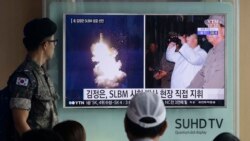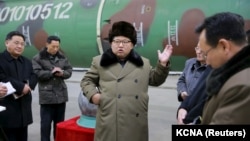A pair of nuclear tests, progress on submarine-based attack missiles, and two satellites launched into space are the highlights of North Korean leader Kim Jong Un’s nearly four years in power.
Despite what the United Nations says are the strongest sanctions against the repressive regime, why hasn’t Kim curtailed his provocative behavior?
Speaking on VOA’s Asia Weekly podcast, Daniel Pinkston, a lecturer on International Relations at Troy University in Seoul, says North Korea is motivated and those “[nuclear and ballistic missile] programs are extremely important” to the regime.
Joshua Stanton, a Washington-based attorney and editor at the website One Free Korea feels that when individuals criticize the effectiveness of sanctions to date, they’re "raising the goalposts to an unrealistic position."
In Stanton’s view, until recently, the sanctions against North Korea have been relatively weak and feels there is still room to make the existing sanctions stronger by enforcing them fully.
Stanton also says it will take time and political will to make the sanctions currently in place effective. However, Kim continues to carry out provocative actions and in recent months, some have asked if it is time to revisit the strategy of relying only on sanctions to change North Korea’s behavior.
“I think that we need to combine them with international pressure on human rights and information operations to reach directly to engage with the people of North Korea as opposed to the state,” he says.
Daniel Pinkston says there are limited options when dealing with North Korea. Sure, nations could choose to disarm North Korea by force, but that would "unleash us so much death and destruction it would be an intense conflict that would lead to many deaths and the cure would be worse than the disease."
With Kim not showing any indications of altering his plans, what should the international community do to steer North Korea towards behavior in line with what it desires?
Joshua Stanton says western countries need to "present the government of North Korea, not necessarily Kim Jong Un personally, but the government of North Korea with an existential choice: Will they pursue nuclear weapons, will they reform, will they make changes in their humanitarian policies to their own people... or will they simply perish" by denying them access to the money that funds the government.
Future interactions
Is that something that realistically can be done? Stanton feels that’s one of the most important and difficult questions right now, given that the United States is in the middle of a presidential election. He also says that the outcome of the South Korean presidential election could also have influence on the international community’s approach on North Korea.
Daniel Pinkston says that the international community can always strive to do better.
“Whatever measures the international community takes I think the regime is so committed… and that we have to remind ourselves remember that this is a case of strategic interaction,” says Pinkston, adding, “North Korea has a vote... They have some say in the outcome it's not based 100 percent on our behavior or counter measures or activities.”
North Korea continues to develop technology to further its weapons capabilities, including submarines capable of launching ballistic missiles.
In response to the DPRK’s actions, South Korea will deploy THAAD, a U.S. high altitude missile defense shield - a measure that’s garnered criticism from China. The U.S. has said the system is aimed at protecting South Korea from attacks by the North, and should not threaten China.
Japan has also announced greater vigilance after North Korean rockets landed in its waters and will update its Patriot missile defenses ahead of the 2020 Olympics.








